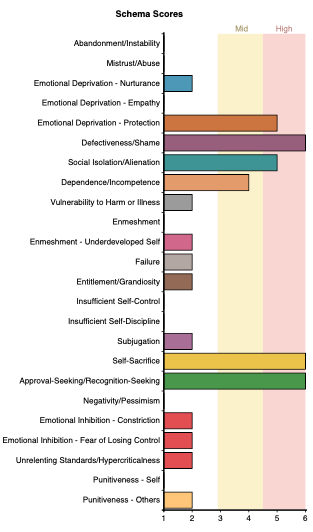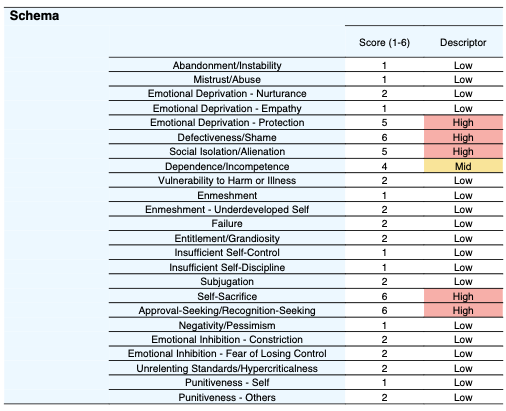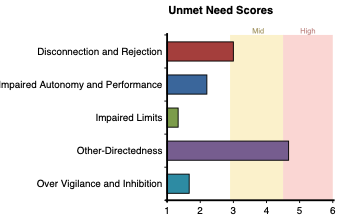The Brief Early Schema Questionnaire (BESQ) is a 24-item screening tool that helps clinicians rapidly assess maladaptive patterns of thoughts, behaviours and emotions.
The Brief Early Schema Questionnaire (BESQ) is a 24-item self-report instrument designed to identify early maladaptive schemas as conceptualised within the framework of Schema Therapy (Young et al., 2006; Brockman et al 2023).
Developed by Brockman, Hayes, and Behary (2023), the BESQ is a condensed alternative to longer schema questionnaires such as the Maladaptive Schema Scale (MSS) or Young Schema Questionnaire (YSQ) and can be helpful in therapy to build shared understanding and begin inquiry into problematic cognitive and emotional patterns.
The BESQ groups schemas into the schema therapy model’s five domains, with each domain corresponding to groups of unmet emotional needs during childhood and adolescence (Young et al., 2006). Furthermore, several schemas are split into sub-domains, for example, Punitiveness is split into (a) Self, and (b) Others.
1. Disconnection and Rejection Domain
– Expectations of instability in relationships. Related to the unmet need for safe attachment, acceptance and care.
Includes schemas of:
Abandonment/Instability
Mistrust/Abuse
Emotional Deprivation (x3 sub-domains)
Defectiveness/Shame
Social Isolation/Alienation
2. Impaired Autonomy and Performance Domain
– Feelings of helplessness, vulnerability and overreliance on others. Related to the unmet need for autonomy, competence and sense of identity.
Includes schemas of:
Dependence/Incompetence
Vulnerability to Harm or Illness
Enmeshment/Underdeveloped Self (x2 sub-domains)
Failure
3. Impaired Limits Domain
– A lack of clear boundaries and structured limitations. Related to the unmet need for realistic limits and self-control.
Includes schemas of:
Entitlement/Grandiosity
Insufficient Self-Control (x2 sub-domains)
4. Other-Directedness Domain
– Excessive attention to others’ needs, driven by fears of disapproval and a strong need for acceptance, often at the expense of one’s own well-being. Related to the unmet need for free expression of needs and emotions.
Includes schemas of:
Subjugation
Self-Sacrifice
Approval/Recognition Seeking
5. Over Vigilance and Inhibition Domain
– An over-emphasis on potential negative outcomes, avoiding mistakes and strict self-control. Related to the unmet need for spontaneity and play.
Includes schemas of:
Negativity/Pessimism
Emotional Inhibition (x2 sub-domains)
Unrelenting Standards
Punitiveness (x2 sub-domains)
Schemas have been shown to have important associations with many mental health diagnoses, including PTSD, borderline personality disorder, dissociative disorders, depression, and anxiety (Bär et al., 2023). Assessment of schemas have typically been assessed with lengthier assessment scales, which can be time-consuming to administer. The brief nature of the BESQ makes it a valuable tool for initial assessment, assisting in formulation and identification of treatment targets.
The BESQ can be used in clinical settings to identify potential areas of focus for therapy, particularly in approaches that emphasise early experiences and their impact on current functioning.
BESQ scores are presented for each individual schema, with responses on a 6-point Likert scale describing how relatable an item is i.e., 1 (Completely unrelated to me) to 6 (Relates to me perfectly).
Higher scores indicate a greater identification with a schema and suggest that it may be relevant to the individual’s cognitive and emotional patterns.
Scores are presented for each schema:


Additionally, graphs are provided for the Unmet Needs categories:


Given the recent release of the BESQ, its psychometric properties have not yet been established. However, the scale was developed on the theoretical framework and principles of Schema Therapy (Brockman et al 2023; Young et al., 2006).
This framework includes core concepts such as early maladaptive schemas, coping styles, and schema modes. The scale draws directly from this model, and its items are closely aligned with its central constructs.
Brockman, R., Hayes, C., & Behary, W. (2023). Brief Early Schema Questionnaire (BESQ).
Bär, A., Bär, H. E., Rijkeboer, M. M., & Lobbestael, J. (2023). Early Maladaptive Schemas and Schema Modes in clinical disorders: A systematic review. Psychology and Psychotherapy, 96(3), 716-747. https://doi.org/10.1111/papt.12465
Brockman, R. N., Simpson, S., Hayes, C., van der Wijngaart, R., & Smout, M. (2023). Cambridge guide to Schema therapy. Cambridge University Press.
Brockman, R., Hayes, C., & Behary, W. (2023). Brief Early Schema Questionnaire (BESQ).
Young, J. E., Klosko, J. S., & Weishaar, M. E. (2006). Schema therapy: A practitioner’s guide. Guilford Press.
NovoPsych’s mission is to help mental health services use psychometric science to improve client outcomes.
© 2023 Copyright – NovoPsych – All rights reserved